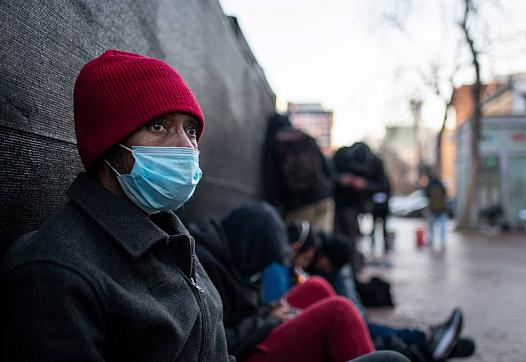Staff at a San Francisco hotel battle an overdose crisis
The story was originally published in KQED with support from the USC Annenberg Center for Health Journalism’s 2021 Data Fellowship.
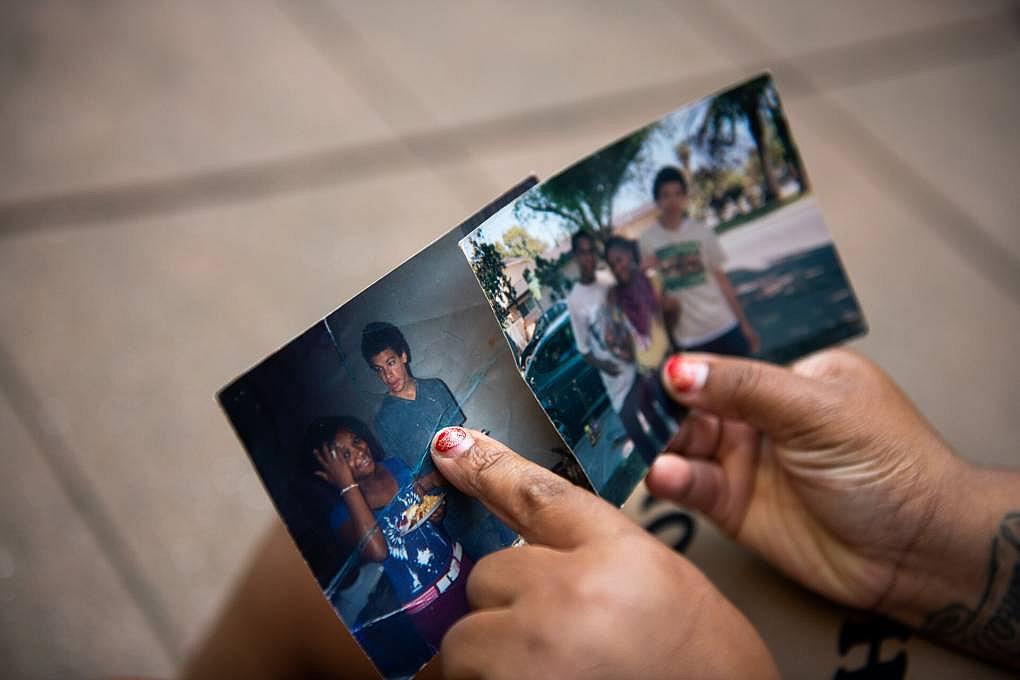
Iyana Spruell points to her cousin Sterling Ulrich in a photo of them as teens in Merced, outside her home in San Francisco's Tenderloin neighborhood, March 14, 2022. Spruell had reconnected with Ulrich last summer, only months before Ulrich died of an overdose at the Hotel Whitcomb in November.
(Beth LaBerge/KQED)
Iyana Spruell had not seen her older cousin, Sterling Ulrich, for about a decade when they reconnected last summer.
After exchanging messages, the cousins learned they lived only blocks apart in San Francisco. Spruell lived in the Tenderloin, and Ulrich lived in the neighborhood, on Market Street. Lacking a home, Ulrich had found shelter at Hotel Whitcomb when it opened for unhoused people during the pandemic, under a statewide program called Project Roomkey.
Ulrich and Spruell soon met up, drinking wine and reminiscing about the fun they had growing up together in Merced. As a kid, Ulrich had idolized Marilyn Monroe’s style and dreamed of being famous in Hollywood, Spruell said.
Ulrich was loving, stylish and unique.
When the cousins were younger, Spruell recalled, “[Ulrich] would dress me up, fix my hair, and say I need to be more girly. Let my hair down and just be you.”
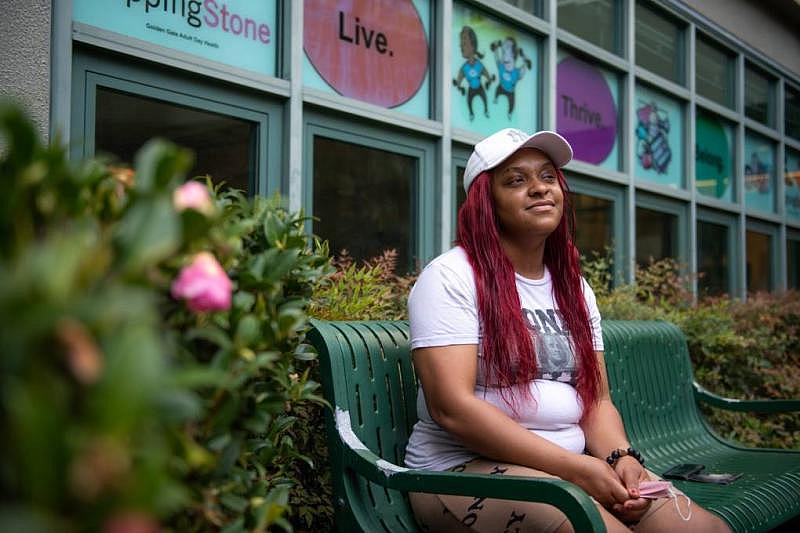
Iyana Spruell sits outside her home in San Francisco's Tenderloin neighborhood on March 14, 2022. (Beth LaBerge/KQED)
During a meetup last year, Spruell says, Ulrich talked briefly about using drugs to feel happy, before quickly changing the subject to how nice it felt to be together again.
The reunited cousins didn’t have long to bond.
Last November, Ulrich fatally overdosed on meth and fentanyl at Hotel Whitcomb.
“I couldn’t believe it,” Spruell said. When she found out, she called Ulrich’s sister, and “when we talked on the phone, she started crying, and I started screaming.”
Hotel staff on the front lines of the city's fentanyl crisis
About 400 unhoused people stay at Hotel Whitcomb, and many deal with substance use disorders. That reality has meant staff who work at the hotel are fighting to keep guests alive.
Eldridge Cruse is a supervisor at Hotel Whitcomb; he works for Five Keys Schools and Programs, the nonprofit overseeing the hotel. Cruse says he’s seen more deaths up close in the last two years than in his entire life.
“It’s frightening, it’s upsetting, it’s disturbing, to see human life hang in the balance,” he said. “You don't know if this person is going to make it, if they’re going to come back.”
'People want to believe that when you give people Narcan it's a magic pill. It's magical sometimes, but it all depends on when we catch it.'
-Eldridge Cruse, supervisor, Five Keys Schools and Programs
At 27, Sterling Ulrich was one of the youngest people to die at Hotel Whitcomb in the last two years. At least 18 people fatally overdosed there from April 2020, when it opened, to April 2022, according to preliminary data from the San Francisco Medical Examiner’s Office. That's a more than a quarter of all overdose deaths in hotels that were opened during the pandemic to house vulnerable San Franciscans.
By contrast, zero people have fatally overdosed in Alameda County’s Project Roomkey hotels, according to the Alameda County Health Care Services Agency.
The risks of using drugs alone
San Francisco Department of Public Health officials knew early in the pandemic that people likely would fatally overdose at the city-run Project Roomkey hotels, known as shelter-in-place hotels. People who use drugs are at greater risk of dying when no one is around to administer Narcan, the brand name for naloxone, a medication used to reverse overdoses.
"There was a great deal of worry. We didn't see any surprising number of overdoses because we had an expectation that there would be a risk. A lot of steps were taken to mitigate that,” said Barry Zevin, medical director of street medicine and shelter health for the San Francisco Department of Public Health.
SFDPH, the DOPE Project, and the San Francisco AIDS Foundation partnered to provide Narcan inside the hotels as well as training on how to use it. Hotel staff also regularly conduct wellness checks to look in on guests who use substances.
Cruse said he tries to reassure staff who feel responsible when they try to reverse overdoses but don’t succeed.
"Someone came to me one time and said, 'I didn't do enough,'" he said. He told his colleague, "'No, you're not to take on that burden that you didn't do enough. You did everything that you could.'"
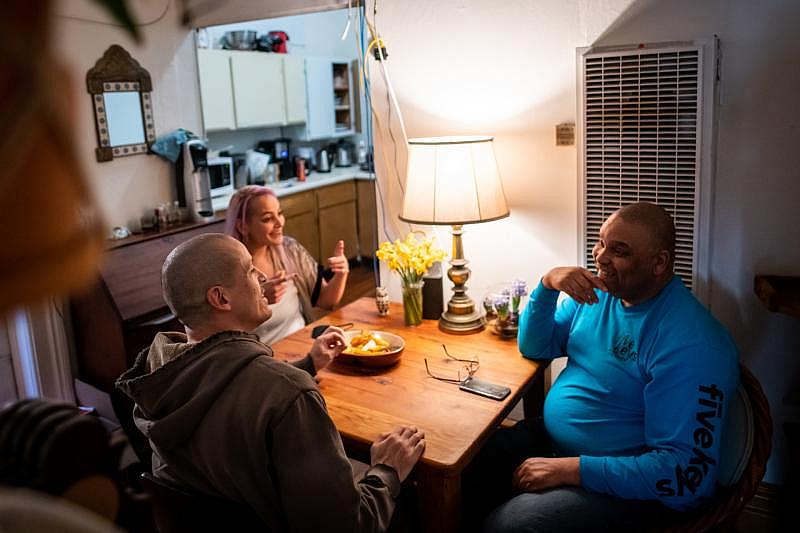
Eldridge Cruse chats with friends Bert Perla and Zarineh Agnew, in San Francisco on March 12, 2021. (Beth LaBerge/KQED)
Fentanyl, which is up to 50 times stronger than heroin, can kill rapidly.
"People want to believe that when you give people Narcan it's a magic pill. It's magical sometimes, but it all depends on when we catch it,” Cruse said.
Earlier this year, a team of researchers at UCSF found that overdose mortality rates in San Francisco during the first year of the pandemic were lower for residents of shelter-in-place hotels than for people who were unhoused and not staying at these hotels.
But for staff who work at these sites, overdoses are traumatic, whether they're fatal and not.
Grief and trauma for staff battling the city's overdose crisis
Earlier this year, Meg O’Neil left her job as the director of housing services at Five Keys. She says one reason was the emotional toll of the job. She estimated that, since Hotel Whitcomb opened in April 2020, staff have used Narcan at least 1,000 times to respond to drug overdoses. O’Neil added that the numbers are hard to track. Because fentanyl is so powerful, staff often need to use more than one dose of Narcan to reverse overdoses.
“I just need space to do some healing around that,” she said. “It's really scary to basically be an EMT but with people you know really well.”
O’Neil said staff also are dealing with many of the same challenges as the people they serve, such as substance use disorder and homelessness.
“[Staff] are coming out of incarceration, coming out of substance use or are newly in recovery,” she said. “We have staff members who are unhoused and we have people who can't find a safe place to stay.”
Some of the staff commute from as far away as Modesto or Sacramento, unable to afford to live in the cities where they work.
Besieged in their own lives and on the job, staff, too, have relapsed, and some have fatally overdosed.
'[Staff are] reviving people, [people] who then turn around and die the next day. Their own mental health is suffering. It's really unethical, really, really, really unethical, to not provide the appropriate level of support.'
-Monique LeSarre, executive director, Rafiki Coalition for Health and Wellness
Hotel staff like Laverne Taylor can relate to the guests. She says she was addicted to drugs as a teenager, and lived on the street. She remembers getting high just to stay warm.
Taylor was in and out of prison before receiving a life sentence for murder. After serving 26 years behind bars, she was released in 2019 when then-Gov. Jerry Brown commuted her sentence. Soon after that, she was working at Hotel Whitcomb.
Taylor says her heart broke watching guests struggle to adjust to living inside after years on the streets.
"You had people you took off the street, literally, and you put them all in a [three]-star hotel," Taylor said. "You'd see the room and it was like it was demolished, tents in there. We couldn't understand. 'Why do you have a tent in there?'"
She said some people needed help even for mundane tasks like turning on showers, or using television remote controls.
Taylor has used CPR on guests more than a dozen times, and has attempted to revive people after overdoses — usually successfully, but sometimes not.
She was working at Hotel Whitcomb the day Sterling Ulrich died. She’d grown close to Ulrich, who was just beginning to open up around staff.
When Taylor heard the emergency call on the hotel radio along with Ulrich’s name, her heart started racing. When she found Ulrich, she began CPR, tag-teaming the mouth breathing and chest compressions with another colleague, until it became clear that they couldn’t save Ulrich.
“It’s like a scene from a bad movie where people are trying, and trying, and trying until someone pulls them off,” Taylor said.
Staff need ongoing counseling for trauma
Soon after Hotel Whitcomb opened to vulnerable residents, an organization called the Harm Reduction Therapy Center began providing counseling for staff who were seeing overdoses.
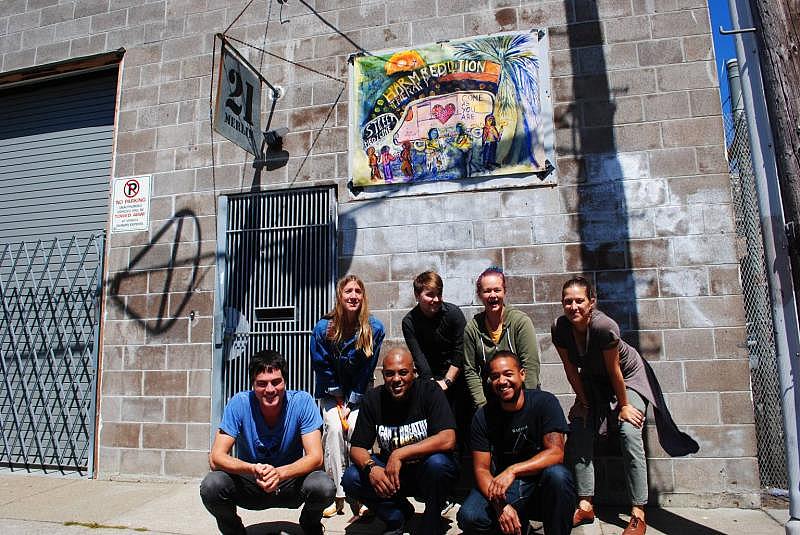
Harm Reduction Therapy Center's leadership team at a holiday gathering. Left to right: Nathan Kamps-Hughes, program coordinator and staff therapist; Abigail McMorrow, staff therapist; Maurice Byrd, director of training and business operations; Maxx Malloy, staff therapist; Irina Alexander, staff therapist; Jason Brown, program coordinator and staff therapist; and Anna Berg, director of programs. (Courtesy Anna Berg)
Anna Berg is a clinical social worker for the center. She says Hotel Whitcomb became a microcosm of the city’s multiple social crises. The same mental health and substance use issues playing out every day on the streets were now happening under one roof, and seeing that took a toll on staff. She said staff there need longterm support rather than only after overdoses and other emergencies.
She said staff trauma has been a major unintended consequence of these hotels.
“Seeing somebody go through a trauma is still a trauma — these repeated exposures that staff are having to incredibly traumatic events where it's life or death and you feel responsible for that, even if you're not,” she said.
Brandi Marshall took a job with Five Keys in November specifically to address the need for staff support. She says it’s hard to work at Hotel Whitcomb, where guests continue to use lethal drugs after overdosing.
Marshall served in the military, and volunteered to go back to Iraq soon after the Sept. 11, 2001, terrorist attacks. She said because of the trauma she experienced seeing people die while in the military, she knows how to block out some of the emotional aspects of her job at the hotel.
“I have mastered that art from Iraq,” she said. “[My co-workers] really absorb a lot, coming out of prison. They absorb all of what is happening around them.”
Monique LeSarre, executive director at Rafiki Coalition for Health and Wellness, a nonprofit aimed at reducing health inequities in underserved communities, said her therapists have counseled Hotel Whitcomb staff in crisis.
“[Staff are] reviving people, [people] who then turn around and die the next day,” said LeSarre. “Their own mental health is suffering. It’s really unethical, really, really, really unethical, to not provide the appropriate level of support.”
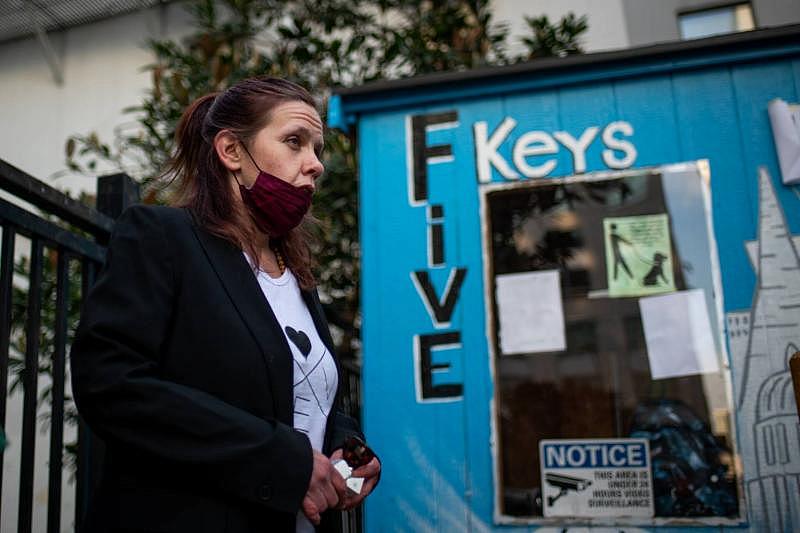
Dawn Koch, a guest at Hotel Whitcomb, talks to a Five Keys staff member (not pictured) at the Hotel Whitcomb in San Francisco on Feb. 18, 2022. (Beth LaBerge/KQED)
LeSarre said she sought funding for mental health support from the San Francisco Department of Homelessness and Supportive Housing. But, she said, the agency turned down the grant proposal.
When asked about this, Denny Machuca-Grebe, a spokesperson with the agency, responded in a written statement.
“As agencies that day in and day out provide support and services for individuals with many challenges around mental health, substance use and housing, we are very attuned to how difficult it could be to serve vulnerable communities while caring for ourselves as individuals,” he wrote.
Machuca-Grebe did not respond to KQED’s question about any efforts that might be underway to support the mental health of staff at shelter-in-place hotels.
He said to connect with Five Keys for steps the nonprofit has taken to support their staff.
Marshall says she and other employees are beginning to open up more about some of the trauma they’re facing. Five Keys has started support groups for employees, including a group for women. At first only one or two people would attend these sessions. Now, dozens of people show up, Marshall said, talking about everything from their own children who have passed away to reversing overdoses.
Steps toward stability
Dawn Koch has lived at Hotel Whitcomb since last August, and she wants to start a group for residents living at the hotel to support each other. She carries Narcan with her everywhere, and says building a sense of community is an important part of harm reduction, too.
"There's too many people that are so lost they don't even know themselves anymore. Unless you have somebody to help you from that point, you feel like you're always lost,” she said.
“I've really seen too many people here one minute and then gone the next,” she said.
Teddy Melendez, another resident at the hotel, uses fentanyl at the curb so people are nearby to save him if he overdoses. People regularly gather in crowds outside the hotel and use drugs.
Melendez said he’s been using less fentanyl because he’s taking medication to reduce cravings and ease withdrawal pain.
“I want to have my own spot, have my own apartment. For me to do that, I have to stop using,” he said.
San Francisco officials plan to end the city’s emergency hotel program in September. So far, a little more than half of guests who are considered eligible for housing through the program have found it, and it's mostly permanent housing. Eligibility is based on a number of factors, such as a person's health or how long they’ve been unhoused.
Eldridge Cruse, the hotel supervisor, tells staff to focus on the overdoses they’ve reversed rather than the people they couldn’t save.
“You’ve got to have an X-ray vision or cameras in every room, and monitor every room to catch what’s going on. But you can’t,” Cruse said. “We were dealt the hand, and we played it the best we could. No loss of life is acceptable. But we couldn’t stop what was going to happen. We couldn’t.”
This article was produced as a project for the USC Annenberg Center for Health Journalism's 2021 Data Fellowship.

